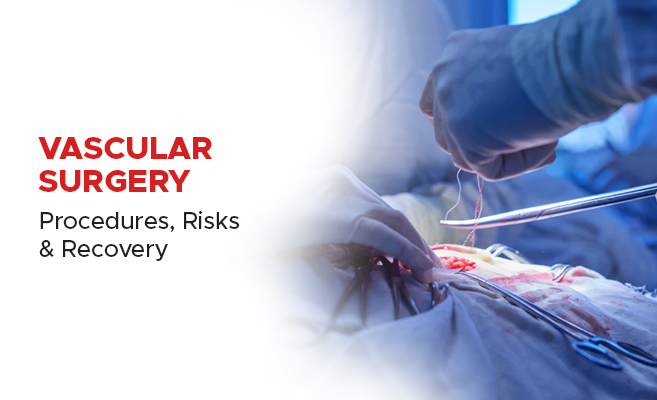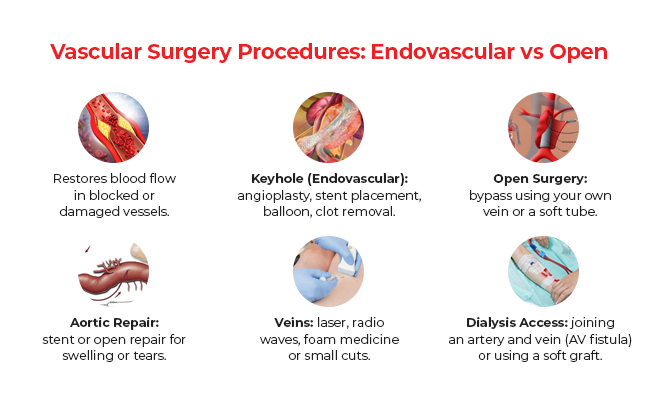Vascular Surgery: Procedures, Risks and Recovery

Numb toes while walking, swollen veins or a sudden clot in the leg, vascular problems can show up in many ways. And when medicines no longer work, surgery becomes an important step.
Vascular surgery treats both keyhole and open treatments for blocked, narrowed or damaged vessels. Vascular Surgery Procedures such as angioplasty, stents, vein ablation, bypass grafts and aneurysm repair are chosen based on your scans, symptoms and overall health.
Every plan carries some Vascular Surgery Risk but we reduce them through careful checks, advanced imaging and specialized care. Vascular Surgery Recovery is structured to help you move early, heal safely and return to routine with follow-up support.
At PSRI Hospital in Delhi, our vascular team works in state-of-the-art theatres with ICU support and a multidisciplinary approach, making us the best hospital in Delhi for advanced vascular care.
Vascular Surgery Procedures: Endovascular vs Open
Arteries: restoring blood flow
When leg pain starts while walking or wounds don’t heal, doctors aim to restore circulation and prevent tissue loss through surgery.
- Keyhole methods: tiny tubes widen or clean the vessel using balloons, stents or clot removal.
- Open surgery: if the blockage is big, doctors create a new path for blood flow, called a bypass, using your own vein or a safe tube.
Aorta: repairing weak spots
The body’s main artery can sometimes swell or tear. Doctors repair it with stent tubes placed inside or, if needed with open surgery. After repair, doctors check regularly to make sure there are no leaks.
Veins: treating clots and swelling
- Blood Clots: a clot in the leg can move to the lungs and cause serious problems. Prevention and early treatment reduce this risk.
- Varicose veins: swollen surface veins can be treated with laser, radio waves, foam medicine or small cuts. These treatments also help heal ulcers, reduce swelling and improve appearance.
Dialysis and other conditions
For long-term dialysis, doctors create a strong access point using an AV fistula (joining a vein and artery) or a soft graft.

Other problems treated include blocked belly vessels, kidney artery narrowing, vessel traps in the chest or legs and conditions that affect small vessels such as Buerger disease or Raynaud phenomenon.
Vascular Surgery Risk: Your Profile and How We Reduce It?
Every surgery carries some risk but most can be lowered with the right checks and planning. Here’s how we do it:
- Personal risk check: Before surgery, our doctors study your health, test reports and scan results. This helps them to plan the safest approach.
- Preparation matters: Controlling diabetes, blood pressure and cholesterol and quitting smoking before surgery all reduce complications.
- Medicines for safety: In many cases, patients take blood-thinning medicines such as aspirin, clopidogrel or heparin to prevent clots.
- Technology-related risks: Some scans and treatments use dye or X-rays. Doctors take steps to avoid kidney strain, allergies or too much radiation.
- Procedure risks we monitor: These include bleeding, wound infection, blockage of a graft, nerve injury or strain on the heart. Each patient is closely watched to detect and treat any problem early.
- Anaesthesia choices: Depending on the procedure, doctors may use general, regional or local anaesthesia to keep you safe and comfortable.
At PSRI Hospital, leading multi speciality hospital in Delhi risks are reduced by careful planning, expert monitoring and support from ICU and specialist teams at every stage.
Vascular Surgery Recovery: What to Expect from Day 1 to Return-to-Work
In hospital:
- Patients are encouraged to move their legs or walk a little (early ambulation) soon after surgery if it is safe.
- Pain is managed with medicines so recovery is more comfortable.
At home:
- Keep the wound clean and follow the instructions for dressing changes.
- Care for the scar with gentle cleaning and hygiene.
- Avoid lifting heavy weights or sudden activity until cleared by your doctor.
- Driving should wait until your doctor confirms it is safe.
- The timeline to return to work depends on the type of procedure. Keyhole treatments often mean faster recovery, while open surgery takes longer.
Long-term health:
- Eat a heart-healthy diet to support vessel strength.
- Keep blood pressure, diabetes and cholesterol under control with medicines and lifestyle.
- For patients with diabetes, regular foot care is very important to prevent wounds.
Follow-up care:
- Doctors give a clear schedule for follow-up visits and scans.
- Duplex scans may be used to check bypass grafts or stents.
- Patients are taught the signs of complications to watch for, such as swelling, fever or sudden pain.
- The goal is long-lasting results and a better quality of life after vascular surgery.
At PSRI Hospital, vascular surgery recovery is supported with clear guidance, education and rehabilitation programs from doctors and nurses that helps you heal safely and return to normal life quickly.
Tests That Decide Your Plan Before Any Vascular Surgery Procedures
Before any vascular surgery procedures, doctors at PSRI Hospital run below simple checks:
- Basic checks: Doctors check blood flow in your legs and feet compared to your arms. This shows how well circulation is reaching your tissues.
- Scans: An ultrasound is usually the first test, as it is quick and painless. If more detail is needed, CT or MRI scans are done to map the blood vessels. In some cases, a dye test with X-rays may be needed for the clear picture.
- During surgery: Live X-rays guide the doctor so stents, balloons or grafts are placed in the right spot with safety.
Red-Flag Symptoms: Seek Urgent Help Now
- Stroke signs: sudden drooping of the face, weakness in one arm or trouble speaking , call emergency help immediately.
- Chest danger: sharp chest pain or sudden breathlessness, especially if you had a blood clot earlier.
- Leg circulation loss: a leg or foot that turns cold, pale or becomes very painful.
- Severe swelling: a tight, painful calf with numbness needs urgent care.
- After surgery: heavy bleeding, spreading redness near the wound or a high fever are warning signs.
Book Your Vascular Surgery Consultation at PSRI Hospital Today
Worried about poor circulation, varicose veins or a possible blockage? Start with a clear, face-to-face check with an experienced vascular surgeon. At PSRI Hospital, a multi speciality hospital in Delhi, our senior vascular surgeons make care simple, safe and structured with:
- Right diagnosis first: We review your symptoms and scans, explain options for Vascular Surgery Procedures and confirm what you actually need.
- Personalised plan: You get a step-by-step treatment path, risks explained clearly and a recovery timeline you can follow at home.
- Complete Guidance: We tell you what tests or medicines to continue, what to pause and when to return to routine.
- Track progress: Scheduled check-ins and follow-ups keep results on track.
- Easy access: Fast diagnostics and coordinated teams in South Delhi, one place, start to finish.
Call: +91 84 84 84 84 17 | 011-6142-6142
or Book Appointment Here
FAQs
Q1. Do veins grow back after treatment?
Ans. The treated veins do not grow back. However, over time new surface veins can appear, which is why follow-up care and healthy lifestyle choices are important.
Q2. Can I exercise after vascular surgery and when?
Ans. Light walking usually starts early in recovery, often within days. Heavy exercise or gym routines may take a few weeks to months, depending on whether you had a keyhole or open procedure.
Q3. Will my condition always need surgery or can medicines be enough?
Ans. Not every vascular problem needs surgery. Some cases are managed with medicines, lifestyle changes or close monitoring. Surgery is suggested only when blood flow is at serious risk or symptoms are severe.
Q4. What are the benefits of keyhole (endovascular) surgery over open surgery?
Ans. Keyhole treatments usually mean smaller cuts, less pain, shorter hospital stays and faster recovery. Open surgery is still chosen when a stronger, long-lasting repair is needed.
Q5. Can I travel or fly after vascular surgery?
Ans. Most people can travel once the doctor confirms healing is safe. If flying, you may be advised to wear compression stockings, walk often during the flight and stay well hydrated to reduce clot risk.

 Book An Appointment
Book An Appointment Virtual Consultation
Virtual Consultation





